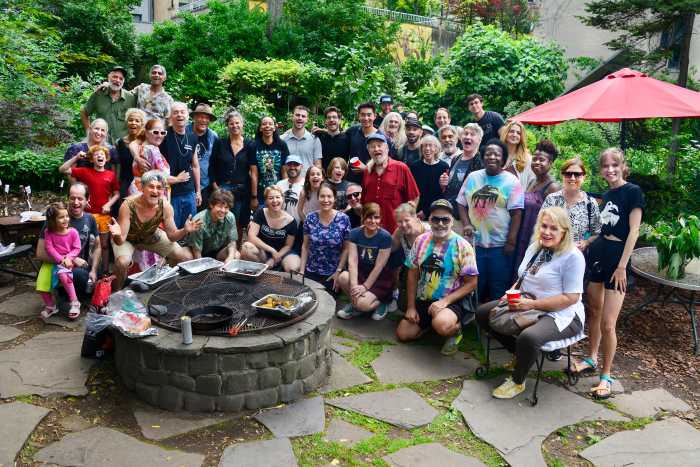By Patrick Hedlund
Vesuvio’s curious case
While longtime Soho staple Vesuvio Bakery has been closed for more than six months, leading to speculation about its demise, the owner still plans to open in the new year despite some curious recent activity.
A note posted on its window back in June, which remains there today, declared the bakery would be “closed for the next couple of weeks while undergoing renovations.” Then, earlier this month, a real estate listing looking for a new tenant for the tiny space at 160 Prince St. appeared online, only to be removed shortly thereafter.
Current owner Andrew Veniopoulos explained that the listing popped up as a result of a real estate agent who “jumped the gun,” and that ongoing work on the property’s plumbing system has delayed the reopening.
“Everything’s hunky-dory,” assured Veniopoulos this week. “It’s going to [operate] as is.” He had previously told The Villager he planned to relaunch in August. Veniopoulos added that he recently partnered with an investor to help the revival effort, but that the landlord also has to complete some repair work for them to move forward.
The bakery was formerly owned by “Mayor of Greenwich Village” Tony Dapolito, but has been operated since 2003 by Venipoulos, who also works for the real estate brokerage Bapple, located across the street.
Sean Sweeney, director of the Soho Alliance, said Dapolito used to rely on multiple restaurants buying bread from the bakery, but that those deals have ceased since Dapolito left.
Piers’ pigeon war
A group of angry bird lovers have been protesting the use of what they call inhumane pigeon traps at the Chelsea Piers Sports Complex. At the end of the year, Chelsea residents Terry Walrath and Wendy Farina will cancel their gym memberships at the complex after 13 years due to Chelsea Piers’ use of the traps. Chelsea Piers management has installed the traps on fire escapes to prevent the birds from pooping on the property — a move permitted by the city Health Department to help stem the spread of health risks posed by the bird droppings.
“It’s a concentration camp for pigeons up there,” said Walrath, a bird owner herself who said she started noticing the devices about a year ago. “I feel like there’s a better way to deal with it.”
The traps, provided by a New Jersey-based pest-control service, ensnare the birds in a wood-and-wire cage to prevent them from massing freely on fire escapes. The company then collects the birds and claims to release them back into the wild, although the Health Department-issued permit does allow the birds to be “euthanized humanely,” said spokesperson Celina De Leon. “I’m appalled by this,” Walrath added, saying she’s heard the pigeons are gassed or simply have their necks broken in the extermination process. A group of guerilla pigeon protectors has even gone so far as to release the birds from the traps, eventually getting chased away by Chelsea Piers security.
Erica Schietinger, a Chelsea Piers management spokesperson, said pigeon droppings constitute visitors’ number-one complaint. She noted that due to the elimination of the bubble structure on the former Pier 63 and the pier shed on 64, the complex has experienced an influx of pigeons that formerly roosted in those spots.
“Pigeon excrement began to cover many public areas of the piers frequented by our guests, many of whom are children,” Schietinger said. “From a sanitary standpoint, it is simply not safe for our customers, specifically children, to be in contact with this type of waste.”
The Health Department Web site lists three minor human diseases that can be contracted through contact with pigeon waste. Schietinger added that measures such as applying a grease-like substance to pigeon perches, installing items resembling owls and snakes to frighten the birds away and anti-roosting spikes were all tried before the traps, to no avail.
Al Streit, founder of the rescue, advocacy and educational group Pigeon People, said his goal has been to try to convince Chelsea Piers management that it could use kinder methods to get the same result.
“The whole idea that pigeons are dangerous is plain wrong,” he said, calling dog doo a greater health threat.
Donovan headed to D.C.
President-elect Barack Obama tapped the head of the city’s Department of Housing Preservation and Development for a top White House post last week, naming H.P.D.’s Shaun Donovan secretary of the U.S. Department of Housing and Urban Development (HUD).
Donovan, who has led H.P.D. since 2004, had worked for HUD during the Clinton administration and brings a sterling record and has earned high praise for his work in developing affordable housing initiatives in the city.
Obama made the announcement in his weekly radio address on Dec. 13, calling Donovan an “outstanding public servant.”
“We need to approach the old challenge of affordable housing with new energy, new ideas and a new, efficient style of leadership,” Obama said. “We need to understand that the old ways of looking at our cities just won’t do. That means promoting cities as the backbone of regional growth by not only solving the problems in our cities, but seizing the opportunities in our growing suburbs, exurbs and metropolitan areas.”
Donovan, 42, a trained architect, helped create a $7.5 billion plan for the construction and preservation of 165,000 affordable housing units in the city that serve roughly half a million residents. The city announced in the fall it had reached the halfway point of its goal by already creating more than 82,000 of those units.
Said Mayor Mike Bloomberg, “While this country is in the midst of a crisis with regard to housing, it’s heartening that President-elect Obama has made the best choice he possibly could for HUD and for the country.”
mixeduse@communitymediallc.com





































